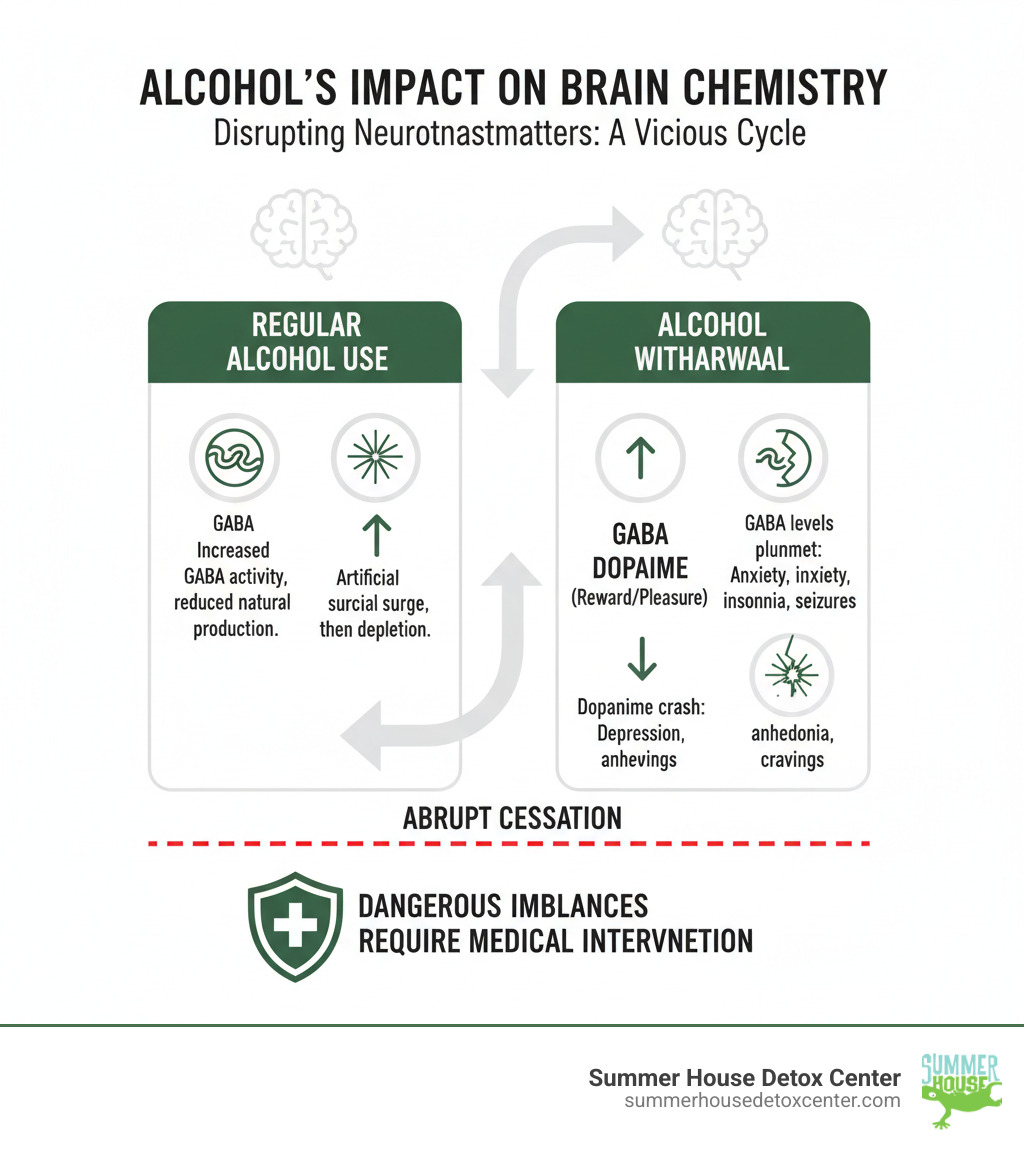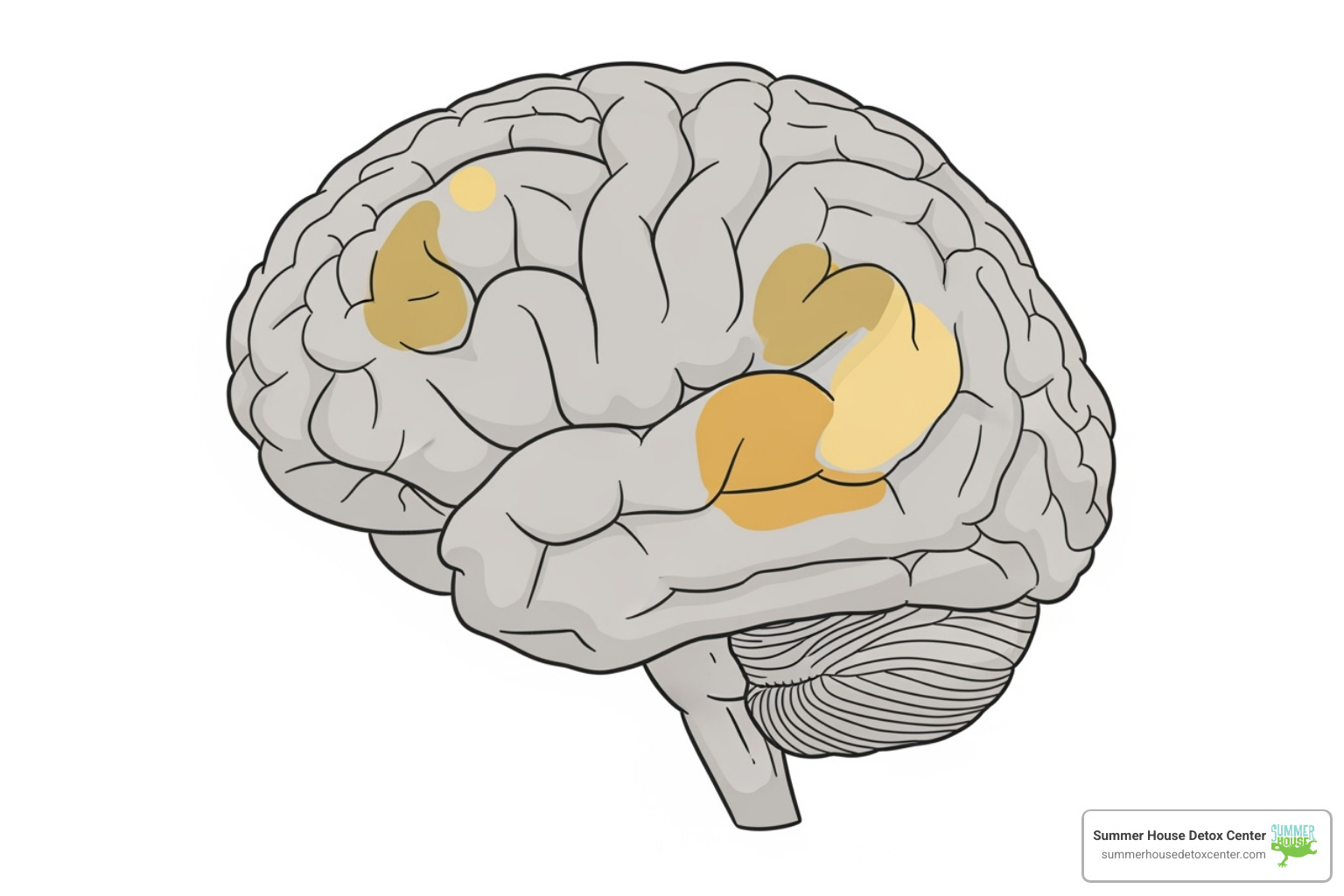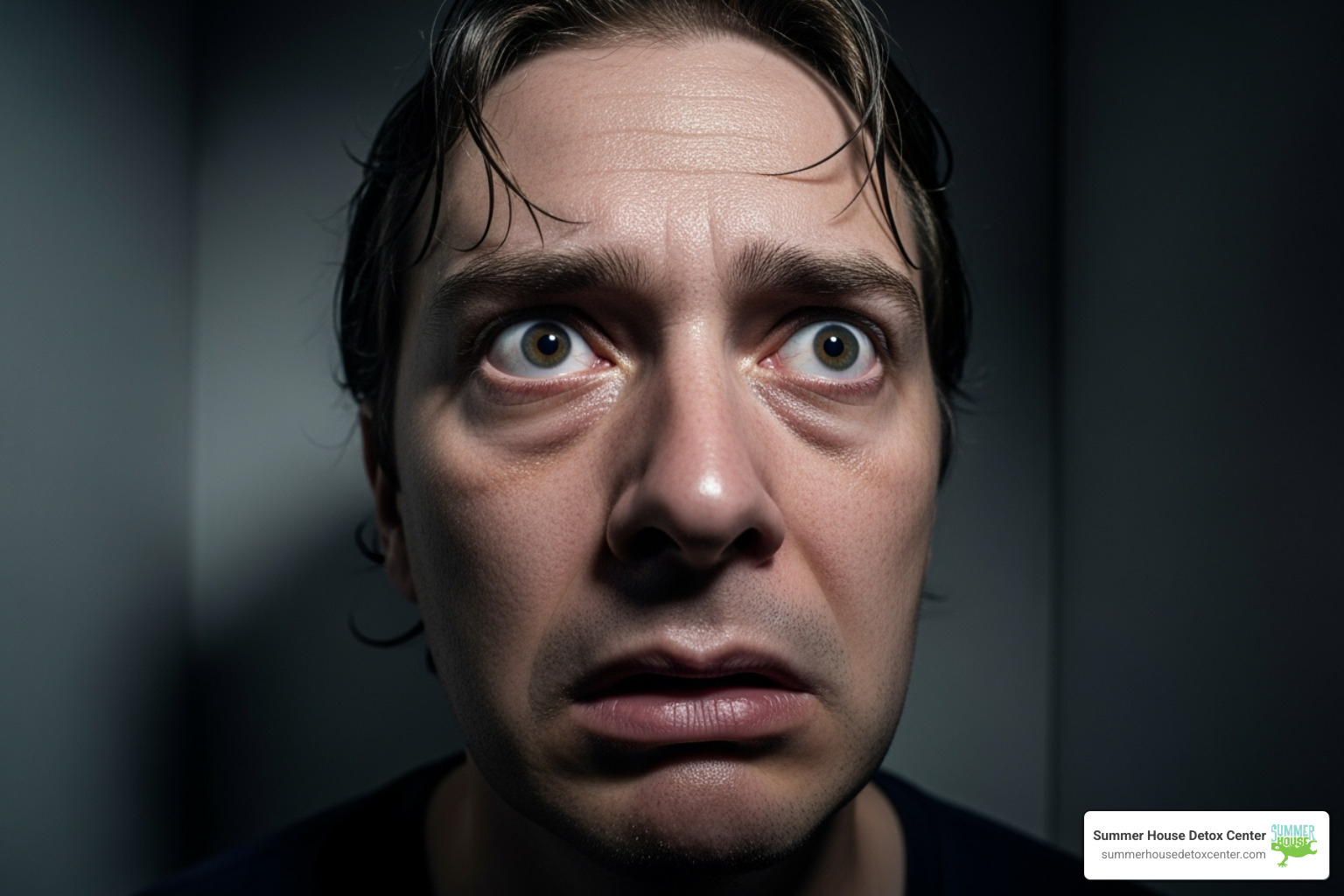Understanding the Connection Between Alcohol Detox and Mental Health
The connection between alcohol detox and mental health is a critical, complex issue for millions with Alcohol Use Disorder (AUD). The relationship between these two aspects of recovery is deeper than many realize.
Quick Facts About Alcohol Detox and Mental Health:
- 50% of people with alcohol use disorder experience withdrawal symptoms when stopping
- Anxiety and depression are the most common mental health symptoms during detox
- 72 hours is typically when withdrawal symptoms peak mentally and physically
- Medical supervision is essential for managing both physical and psychological symptoms
- Integrated treatment addresses both addiction and mental health simultaneously
In Florida, where AUD is a significant concern, this understanding is vital. Recovery in Miami can leverage the climate and lifestyle, but it must begin with safe, medically supervised detox.
Alcohol is a central nervous system depressant. With regular use, your brain adapts to its presence. When you stop drinking, the brain becomes overstimulated, creating a dangerous imbalance that leads to withdrawal symptoms like:
- Severe anxiety and panic attacks
- Depression and mood swings
- Confusion and difficulty thinking clearly
- Sleep problems and nightmares
- In severe cases, hallucinations or seizures
This process is deeply psychological. Your brain must relearn to function without alcohol, causing intense mental health symptoms during withdrawal. This is why professional medical supervision is essential for your safety and success.

Simple alcohol detox mental health word guide:
The Brain on Withdrawal: How Alcohol Detox Impacts Mental Health
Understanding the brain’s response to alcohol withdrawal explains the intensity of the alcohol detox mental health symptoms. As a Central Nervous System (CNS) depressant, alcohol slows brain activity. To compensate for chronic use, the brain increases its own stimulating chemicals. When alcohol is removed, this compensation leads to hyperactivity.
This brain overactivity creates a perfect storm for withdrawal symptoms. The neurotransmitter imbalance involves a drop in calming GABA and a surge in excitatory glutamate. Dopamine and serotonin levels, which regulate mood and sleep, are also disrupted.
This neurochemical chaos is why withdrawal can be dangerous. Understanding The Science Behind Detox: How the Body Heals from Substance Abuse clarifies why professional support is so vital during this vulnerable time.

Common Mental Health Symptoms of Withdrawal
The mental health symptoms of withdrawal are a direct result of these chemical changes. They can range from uncomfortable to overwhelming, which is why professional support is critical.
- Anxiety and Panic Attacks: Intense, often paralyzing anxiety is common, far beyond everyday worry.
- Depression and Mood Swings: Feelings of hopelessness can occur alongside sudden, dramatic shifts in emotion.
- Irritability: Small frustrations can trigger intense anger as your emotional regulation system struggles.
- Insomnia and Nightmares: Sleep is frequently disrupted by the inability to fall or stay asleep, and by vivid nightmares.
- Brain Fog and Confusion: Difficulty concentrating, memory problems, and general confusion are typical.
These symptoms highlight why understanding Alcohol Abuse vs. Alcoholism: What’s the Difference? can help you recognize when professional help is necessary.
Severe Psychological Effects
Alcohol withdrawal can escalate to severe, life-threatening territory quickly and unpredictably. This is why alcohol detox mental health concerns demand medical supervision.
- Hallucinations: These can begin 12-24 hours after the last drink and may be auditory, visual, or tactile (feeling things on the skin). They can be terrifying.
- Psychosis: A more serious state involving a loss of contact with reality, paranoia, and delusions, requiring immediate medical care.
- Delirium Tremens (DTs): Affecting about 1-1.5% of people, DTs are a life-threatening emergency. Symptoms, appearing 48-72 hours post-detox, include severe agitation, confusion, fever, and rapid heart rate. DTs can be fatal in 5-10% of untreated cases.
- Seizures: Generalized seizures are a serious risk, most often occurring 6-48 hours into withdrawal. They indicate a nervous system in crisis.
Here in Miami, it’s crucial to start recovery safely. Recognizing Alcohol Withdrawal Signs: How to Know You Need Professional Alcohol Detox Treatment could save your life.
The Withdrawal Timeline: What to Expect Mentally and Emotionally
While each person’s withdrawal experience is unique, the mental and emotional symptoms of alcohol detox mental health typically follow a predictable timeline. Mental symptoms often appear first and last the longest. Understanding this timeline helps our team at Summer House Detox Center prepare the right support, ensuring you’re not going through it alone.

Stage 1: The First 24 Hours
Symptoms typically begin 6 to 12 hours after the last drink. Early symptoms include intense anxiety, restlessness, and irritability. Sleep is often difficult due to racing thoughts or nightmares. Brain fog can make simple decisions feel overwhelming. These are your body’s first signals that significant changes are underway. For more insight, see Alcohol Detox: How Long Does It Take?.
Stage 2: 24-72 Hours (Peak Withdrawal)
This period marks the peak intensity of withdrawal symptoms and is the most dangerous time without medical care. Anxiety can escalate to panic attacks. Confusion may worsen, and terrifying, realistic hallucinations can occur. The risk of seizures peaks during this stage. Delirium Tremens (DTs), the most severe form of withdrawal, can also begin, creating a medical emergency that requires immediate intervention. Trying to endure this stage alone is not a matter of strength; it’s a dangerous risk to your health.
Stage 3: Post-Acute Withdrawal Syndrome (PAWS)
After the acute phase, Post-Acute Withdrawal Syndrome (PAWS) can occur, with lingering symptoms that last for weeks or months as the brain continues to heal. PAWS symptoms include unpredictable emotions, low energy, poor concentration, sleep problems, and sudden, intense cravings. While challenging, this is a sign of the brain healing. Patience and aftercare planning are crucial during this phase, as the journey doesn’t end with detox. Learn more about this continued journey here: What Happens After Alcohol Detox?.
Integrated Treatment for Alcohol Detox Mental Health
Successful alcohol detox requires more than medical monitoring; it needs comprehensive, integrated care. At Summer House Detox Center in Miami, we treat the whole person, not just the symptoms of alcohol detox mental health.
Dual diagnosis—having both an alcohol use disorder and a co-occurring mental health condition like anxiety or depression—is very common. Treating one condition without the other is ineffective and often leads to relapse. Our integrated approach addresses both simultaneously from day one for a safer, more effective detox.
In Miami’s healing environment, we provide medically supervised detox that prioritizes your safety, comfort, and dignity. Our staff, many in recovery themselves, offer compassionate care born from personal experience. This comprehensive approach is why medical detox is such a vital first step in recovery.

The Crucial Role of Therapy in Managing Alcohol Detox Mental Health
While medication stabilizes the body, therapy is essential for healing the mind. It provides a safe space to process emotions and build coping skills for long-term recovery. We offer both individual counseling to explore underlying issues like trauma or anxiety, and group therapy, which provides powerful peer support and reduces feelings of isolation.
We use evidence-based therapies like Cognitive-Behavioral Therapy (CBT) to identify and change negative thought patterns, and Motivational Interviewing to help you find your own internal reasons for change. These approaches are essential for building the skills you’ll need long after detox. Learn more about the vital role of therapy in detox.
Medications and Holistic Support
Effective management combines medical intervention with holistic support for the mind, body, and spirit. Medically supervised medications, such as benzodiazepines, are used to safely manage withdrawal, prevent seizures, and reduce anxiety. Post-detox medications may also be used to reduce cravings.
Nutritional support is vital. We replenish essential nutrients depleted by alcohol use, particularly thiamine (Vitamin B1), and ensure proper hydration to support physical and mental healing.
Holistic approaches like yoga, meditation, and light exercise are integrated to calm the nervous system, improve mood, and teach mindfulness. We also teach healthy coping strategies for long-term success, including:
- Practicing mindfulness and deep breathing
- Staying physically active
- Connecting with supportive people
- Journaling to process emotions
- Engaging in creative activities
- Spending time in nature
- Setting healthy boundaries
- Reaching out for professional support
Building a Support System for Lasting Recovery in Florida
Detox is the first step; the real work of recovery begins afterward. Building a strong support system is essential for maintaining sobriety and protecting your alcohol detox mental health gains. Florida, and Miami in particular, offers a robust recovery community.
Research confirms that strong support networks improve recovery outcomes. Therefore, aftercare planning and relapse prevention are essential parts of our treatment.

Finding Support in Miami and Beyond
Miami’s recovery community offers diverse options for connection. Peer support groups like Alcoholics Anonymous (AA) and SMART Recovery are cornerstones of long-term sobriety, with many meetings available throughout Miami-Dade. Other resources include community support groups, ongoing professional counseling, and outpatient programs that provide structure while you transition back to daily life. At Summer House Detox Center, we help coordinate this continuing care to ensure a seamless transition.
How Loved Ones Can Provide Effective Support
Family and friends are crucial to recovery but may need guidance on how to help effectively. Effective support from loved ones involves:
- Education: Understanding the science of addiction and recovery.
- Open Communication: Creating a safe space for honest conversation about needs and boundaries.
- Healthy Boundaries: Protecting the recovery process for everyone involved.
- Avoiding Enabling: Not shielding the individual from the natural consequences of their actions.
- Family Self-Care: Family members attending groups like Al-Anon to get their own emotional support.
- Patience: Recognizing that recovery is a long-term process with ups and downs.
At Summer House Detox Center, we understand recovery is a family journey. We provide resources and education to help everyone succeed together, as detailed in Managing Withdrawal Symptoms: How Summer House Detox Center Helps You Through the Hardest Days.
Frequently Asked Questions about Alcohol Detox and Mental Health
Facing the challenges of alcohol detox mental health brings many questions. Here are clear, honest answers to the most common concerns we hear at our Miami facility.
Can alcohol withdrawal cause permanent mental health problems?
The good news is that with proper medical management, alcohol withdrawal typically does not cause permanent mental health issues. The brain has a remarkable capacity to heal (neuroplasticity). Through supervised detox, therapy, and sobriety, symptoms like anxiety, depression, and “brain fog” usually improve significantly over time. However, untreated withdrawal can worsen existing conditions or lead to permanent cognitive issues like Wernicke-Korsakoff syndrome. This risk is why professional treatment is crucial.
How long do the mental health symptoms of alcohol withdrawal last?
The duration varies based on factors like drinking history and overall health. The most intense, or acute, symptoms peak at 24-72 hours and subside within 5-7 days. However, milder Post-Acute Withdrawal Syndrome (PAWS)—including mood swings, low energy, and sleep issues—can persist for weeks or months as the brain continues to heal. Patience with the process is key.
Is it safe to detox from alcohol at home if I have anxiety or depression?
No, it is absolutely not safe to detox from alcohol at home, especially if you have a co-occurring mental health condition like anxiety or depression. Withdrawal can dangerously escalate pre-existing mental health symptoms, leading to severe panic, overwhelming depression, or even psychosis. The physical dangers are also life-threatening, including seizures and Delirium Tremens (DTs), which can be fatal without immediate medical care. A professional facility like Summer House Detox Center provides 24/7 medical monitoring and interventions to manage these complex symptoms safely. Your life is too important to risk detoxing alone. Learn more about our approach to Detox Mental Health.
Your Path Forward to Mental Wellness
Understanding the link between alcohol detox and mental health is a crucial first step toward recovery, whether for yourself or a loved one. Detox is the essential beginning, clearing the way for true healing by addressing both physical withdrawal and mental health simultaneously.
Recovery is a journey with ups and downs. The brain needs time to heal, and this process isn’t always linear. Having the right support from day one makes all the difference. Integrated care means treating the whole person, and when mental health symptoms arise during detox, they require immediate, professional attention.
In Miami, you are not alone. Healing can begin here, but it must start with safe, medically supervised detox.
At Summer House Detox Center, our team—many of whom are in recovery themselves—understands this journey. We’ve helped countless individuals who felt the same fear and hope you may be feeling now. We provide personalized, dignified care without judgment. Our compassionate professionals are here to guide you through the most difficult days toward a better future.
Your mental wellness is as important as your physical health. We address both to build a strong foundation for lasting recovery. Recovery is possible, and it starts with a single phone call.
Ready to begin your recovery with a team that understands your unique needs? Learn more about our comprehensive approach at Alcohol Detox and Recovery.
Learn more about our medically supervised alcohol detox program
